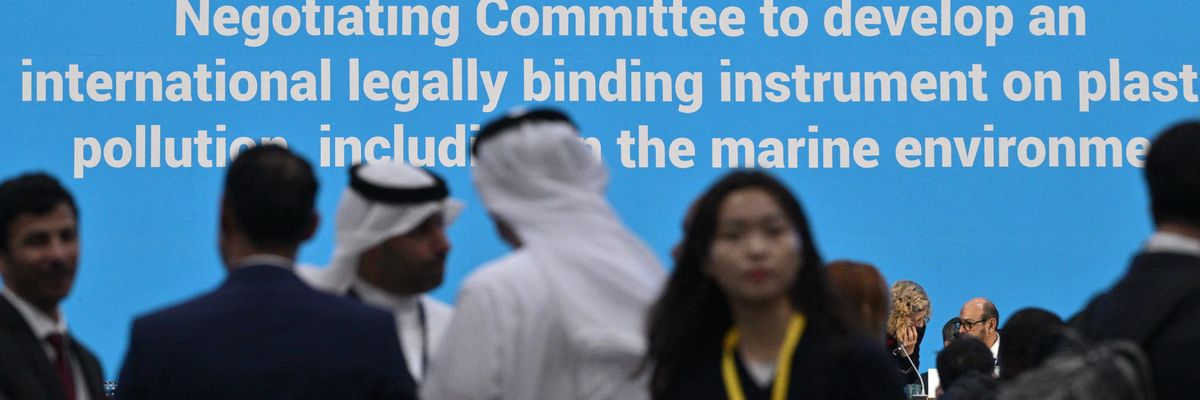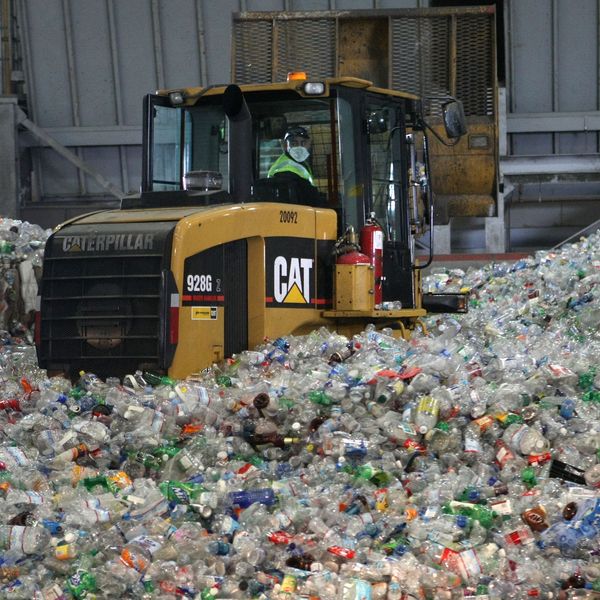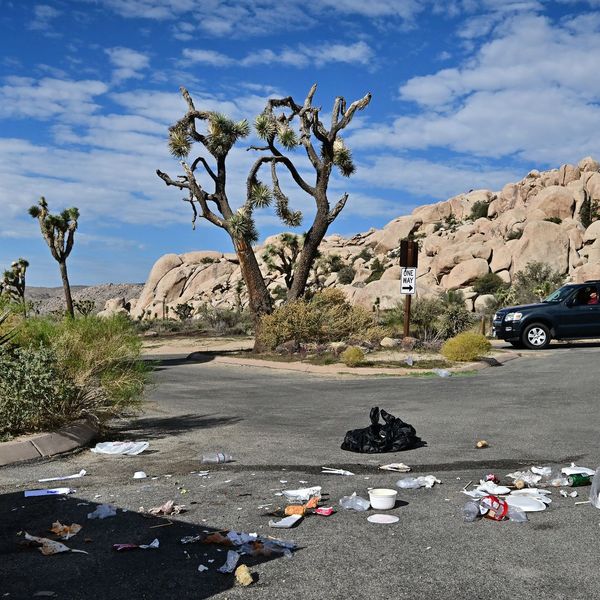
Guests gather prior to the opening of the United Nations Intergovernmental Negotiating Committee on Plastic Pollution (INC-5) in Busan on November 25, 2024
The Biggest Delegation at Plastic Treaty Talks? Plastic Industry Lobbyists
"Allowing fossil fuel and petrochemical companies to exert their influence in these negotiations is like letting foxes guard the henhouse," said one campaigner.
At the fifth and final session of the United Nations Intergovernmental Negotiating Committee to finalize a global plastics treaty in Busan, South Korea, one anti-pollution campaigner noted on Wednesday that "waste pickers, Indigenous peoples, youth leaders, and frontline community members have left their families to travel thousands of miles to be here, not to protect their business interests, but because they are fighting for survival."
But a new analysis from the Center for International Environmental Law (CIEL) raises questions about how marginalized communities fighting plastic pollution will ensure their voices aren't drowned out by the fossil fuel and chemical industry lobbyists in attendance.
"The fact that they are forced to compete for the ear of their representatives with the very industry that is poisoning their communities is a serious injustice," said Ana Rocha, director of the global plastics program at the Global Alliance for Incinerators Alternatives.
CIEL's analysis finds that more lobbyists with a vested interest in continuing plastic production are attending the talks, with 220 fossil fuel and chemical lobbyists represented.
That number makes the industries the biggest delegation at the negotiations, where advocates are pushing for a final treaty that includes legally binding caps on plastic production—not just provisions dictating plastic waste management, which the industry has promoted.
Under the status quo, plastic production is set to triple by 2060. Approximately 460 million tonnes of plastics are currently produced each year.
From 2000-19, plastic waste more than doubled to 353 million tonnes, and only 9% was recycled, according to the Organization for Economic Cooperation and Development.
According to more than 900 independent scientists who signed a declaration demanding an ambitious plastics treaty aimed at ending plastic pollution by 2040, improvements in waste management alone cannot protect the planet and public health from pollution.
But in Busan, industry lobbyists outnumber representatives of the Scientists' Coalition for an Effective Plastics Treaty by 3-to-1.
Only 89 delegates represent the Pacific small island developing states, where the average waste generation per person is 48% higher than the global average due to heavy reliance on packaged imports.
The entire Latin American and Caribbean region has only 165 delegates, and the European Union and its member states combined sent 191 delegates.
Sixteen countries—China, the Dominican Republic, Egypt, Finland, Iran, Kazakhstan, and Malaysia—have included plastic industry lobbyists within their official delegations.
"Allowing fossil fuel and petrochemical companies to exert their influence in these negotiations is like letting foxes guard the henhouse," said Von Hernandez, global coordinator for Break Free From Plastic. "Their oversized presence threatens to turn a critical environmental agreement into a charade, undermining serious efforts to curb plastic production and pollution. Government negotiators must stand firm and ensure these talks are not hijacked by those with vested interests in maintaining the status quo."
CIEL noted that with each Intergovernmental Negotiating Committee meeting, it has observed an increase in the number of fossil fuel and petrochemical industry lobbyists included in the talks. Environmental scientists have reported intimidation and harassment by lobbyists at the meetings.
The oil and gas industry watchdog group Fieldnotes published a report last week showing that in addition to sending lobbyists to Busan, the National Association for PET Container Resources (NAPCOR) has embarked on a yearslong campaign to mislead consumers about the recyclability of disposable plastic products. The coordinated effort has included an infomercial hosted by actor Dennis Quaid and paid deals with TikTok influencers who repeat industry talking points in their videos.
"We have watched industry lobbyists surrounding the negotiations with sadly well-known tactics of obstruction, distraction, intimidation, and misinformation," said Delphine Levi Alvares, global petrochemical campaign coordinator at CIEL, on Wednesday. "Their strategy—lifted straight from the climate negotiations playbook—is designed to preserve the financial interests of countries and companies who are putting their fossil-fueled profits above human health, human rights, and the future of the planet."
"The mandate for this treaty is very clear: ending plastic pollution. Ever-growing evidence from independent scientists, frontline communities, and Indigenous peoples clearly shows that this won't be achieved without reducing plastic production," she added. "The choice is clear: our lives or their bottom line."
An Urgent Message From Our Co-Founder
Dear Common Dreams reader, The U.S. is on a fast track to authoritarianism like nothing I've ever seen. Meanwhile, corporate news outlets are utterly capitulating to Trump, twisting their coverage to avoid drawing his ire while lining up to stuff cash in his pockets. That's why I believe that Common Dreams is doing the best and most consequential reporting that we've ever done. Our small but mighty team is a progressive reporting powerhouse, covering the news every day that the corporate media never will. Our mission has always been simple: To inform. To inspire. And to ignite change for the common good. Now here's the key piece that I want all our readers to understand: None of this would be possible without your financial support. That's not just some fundraising cliche. It's the absolute and literal truth. We don't accept corporate advertising and never will. We don't have a paywall because we don't think people should be blocked from critical news based on their ability to pay. Everything we do is funded by the donations of readers like you. Will you donate now to help power the nonprofit, independent reporting of Common Dreams? Thank you for being a vital member of our community. Together, we can keep independent journalism alive when it’s needed most. - Craig Brown, Co-founder |
At the fifth and final session of the United Nations Intergovernmental Negotiating Committee to finalize a global plastics treaty in Busan, South Korea, one anti-pollution campaigner noted on Wednesday that "waste pickers, Indigenous peoples, youth leaders, and frontline community members have left their families to travel thousands of miles to be here, not to protect their business interests, but because they are fighting for survival."
But a new analysis from the Center for International Environmental Law (CIEL) raises questions about how marginalized communities fighting plastic pollution will ensure their voices aren't drowned out by the fossil fuel and chemical industry lobbyists in attendance.
"The fact that they are forced to compete for the ear of their representatives with the very industry that is poisoning their communities is a serious injustice," said Ana Rocha, director of the global plastics program at the Global Alliance for Incinerators Alternatives.
CIEL's analysis finds that more lobbyists with a vested interest in continuing plastic production are attending the talks, with 220 fossil fuel and chemical lobbyists represented.
That number makes the industries the biggest delegation at the negotiations, where advocates are pushing for a final treaty that includes legally binding caps on plastic production—not just provisions dictating plastic waste management, which the industry has promoted.
Under the status quo, plastic production is set to triple by 2060. Approximately 460 million tonnes of plastics are currently produced each year.
From 2000-19, plastic waste more than doubled to 353 million tonnes, and only 9% was recycled, according to the Organization for Economic Cooperation and Development.
According to more than 900 independent scientists who signed a declaration demanding an ambitious plastics treaty aimed at ending plastic pollution by 2040, improvements in waste management alone cannot protect the planet and public health from pollution.
But in Busan, industry lobbyists outnumber representatives of the Scientists' Coalition for an Effective Plastics Treaty by 3-to-1.
Only 89 delegates represent the Pacific small island developing states, where the average waste generation per person is 48% higher than the global average due to heavy reliance on packaged imports.
The entire Latin American and Caribbean region has only 165 delegates, and the European Union and its member states combined sent 191 delegates.
Sixteen countries—China, the Dominican Republic, Egypt, Finland, Iran, Kazakhstan, and Malaysia—have included plastic industry lobbyists within their official delegations.
"Allowing fossil fuel and petrochemical companies to exert their influence in these negotiations is like letting foxes guard the henhouse," said Von Hernandez, global coordinator for Break Free From Plastic. "Their oversized presence threatens to turn a critical environmental agreement into a charade, undermining serious efforts to curb plastic production and pollution. Government negotiators must stand firm and ensure these talks are not hijacked by those with vested interests in maintaining the status quo."
CIEL noted that with each Intergovernmental Negotiating Committee meeting, it has observed an increase in the number of fossil fuel and petrochemical industry lobbyists included in the talks. Environmental scientists have reported intimidation and harassment by lobbyists at the meetings.
The oil and gas industry watchdog group Fieldnotes published a report last week showing that in addition to sending lobbyists to Busan, the National Association for PET Container Resources (NAPCOR) has embarked on a yearslong campaign to mislead consumers about the recyclability of disposable plastic products. The coordinated effort has included an infomercial hosted by actor Dennis Quaid and paid deals with TikTok influencers who repeat industry talking points in their videos.
"We have watched industry lobbyists surrounding the negotiations with sadly well-known tactics of obstruction, distraction, intimidation, and misinformation," said Delphine Levi Alvares, global petrochemical campaign coordinator at CIEL, on Wednesday. "Their strategy—lifted straight from the climate negotiations playbook—is designed to preserve the financial interests of countries and companies who are putting their fossil-fueled profits above human health, human rights, and the future of the planet."
"The mandate for this treaty is very clear: ending plastic pollution. Ever-growing evidence from independent scientists, frontline communities, and Indigenous peoples clearly shows that this won't be achieved without reducing plastic production," she added. "The choice is clear: our lives or their bottom line."
At the fifth and final session of the United Nations Intergovernmental Negotiating Committee to finalize a global plastics treaty in Busan, South Korea, one anti-pollution campaigner noted on Wednesday that "waste pickers, Indigenous peoples, youth leaders, and frontline community members have left their families to travel thousands of miles to be here, not to protect their business interests, but because they are fighting for survival."
But a new analysis from the Center for International Environmental Law (CIEL) raises questions about how marginalized communities fighting plastic pollution will ensure their voices aren't drowned out by the fossil fuel and chemical industry lobbyists in attendance.
"The fact that they are forced to compete for the ear of their representatives with the very industry that is poisoning their communities is a serious injustice," said Ana Rocha, director of the global plastics program at the Global Alliance for Incinerators Alternatives.
CIEL's analysis finds that more lobbyists with a vested interest in continuing plastic production are attending the talks, with 220 fossil fuel and chemical lobbyists represented.
That number makes the industries the biggest delegation at the negotiations, where advocates are pushing for a final treaty that includes legally binding caps on plastic production—not just provisions dictating plastic waste management, which the industry has promoted.
Under the status quo, plastic production is set to triple by 2060. Approximately 460 million tonnes of plastics are currently produced each year.
From 2000-19, plastic waste more than doubled to 353 million tonnes, and only 9% was recycled, according to the Organization for Economic Cooperation and Development.
According to more than 900 independent scientists who signed a declaration demanding an ambitious plastics treaty aimed at ending plastic pollution by 2040, improvements in waste management alone cannot protect the planet and public health from pollution.
But in Busan, industry lobbyists outnumber representatives of the Scientists' Coalition for an Effective Plastics Treaty by 3-to-1.
Only 89 delegates represent the Pacific small island developing states, where the average waste generation per person is 48% higher than the global average due to heavy reliance on packaged imports.
The entire Latin American and Caribbean region has only 165 delegates, and the European Union and its member states combined sent 191 delegates.
Sixteen countries—China, the Dominican Republic, Egypt, Finland, Iran, Kazakhstan, and Malaysia—have included plastic industry lobbyists within their official delegations.
"Allowing fossil fuel and petrochemical companies to exert their influence in these negotiations is like letting foxes guard the henhouse," said Von Hernandez, global coordinator for Break Free From Plastic. "Their oversized presence threatens to turn a critical environmental agreement into a charade, undermining serious efforts to curb plastic production and pollution. Government negotiators must stand firm and ensure these talks are not hijacked by those with vested interests in maintaining the status quo."
CIEL noted that with each Intergovernmental Negotiating Committee meeting, it has observed an increase in the number of fossil fuel and petrochemical industry lobbyists included in the talks. Environmental scientists have reported intimidation and harassment by lobbyists at the meetings.
The oil and gas industry watchdog group Fieldnotes published a report last week showing that in addition to sending lobbyists to Busan, the National Association for PET Container Resources (NAPCOR) has embarked on a yearslong campaign to mislead consumers about the recyclability of disposable plastic products. The coordinated effort has included an infomercial hosted by actor Dennis Quaid and paid deals with TikTok influencers who repeat industry talking points in their videos.
"We have watched industry lobbyists surrounding the negotiations with sadly well-known tactics of obstruction, distraction, intimidation, and misinformation," said Delphine Levi Alvares, global petrochemical campaign coordinator at CIEL, on Wednesday. "Their strategy—lifted straight from the climate negotiations playbook—is designed to preserve the financial interests of countries and companies who are putting their fossil-fueled profits above human health, human rights, and the future of the planet."
"The mandate for this treaty is very clear: ending plastic pollution. Ever-growing evidence from independent scientists, frontline communities, and Indigenous peoples clearly shows that this won't be achieved without reducing plastic production," she added. "The choice is clear: our lives or their bottom line."

